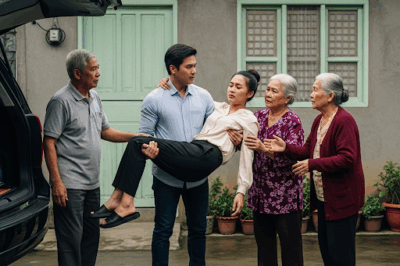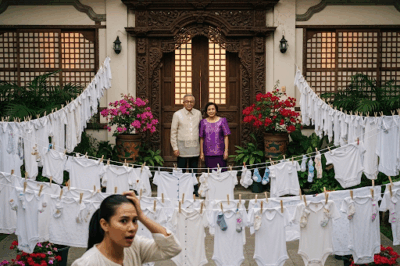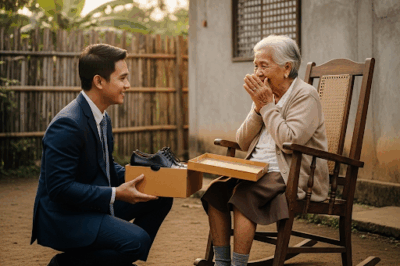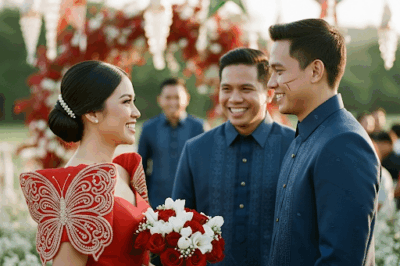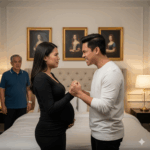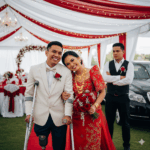She Married an Ugly Husband to Save Her Company, But on Their First Night Together, This Happened…
Episode 1
I didn’t love him. In fact, I could barely look at him without flinching — but I still said, “I do.”
Not out of love, not out of attraction, not even out of pity — but because my father’s legacy was hanging by a thread, and the only man willing to save it came with a price: me.
My name is Kamsi Obiora, CEO of Obiora Textiles, and I am the only daughter of the late textile tycoon, Chief Nathaniel Obiora, whose sudden death left our billion-naira empire drowning in debts I didn’t even know existed.
The board was about to vote me out, investors were pulling out one by one, and I had no plan — no miracle — until Mr. Kunle Ige walked into my office: short, thick-necked, dark and pockmarked skin, protruding teeth, and a presence that made me uncomfortable.
He wasn’t just rich — he was filthy rich.
Owner of seven factories across three continents, a man who preferred to do business from the shadows.
I expected an investment deal, maybe a bailout in exchange for shares — but instead, he leaned in, looked me straight in the eyes, and said:
“I’ll cancel your debt, buy out your shareholders, and triple your revenue in six months. But I want one thing: marry me.”
I thought he was joking.
I laughed. He didn’t.
I told him I needed time to think — he gave me twenty-four hours.
That night, I cried, screamed into pillows, stared at myself in the mirror and asked,
“Is this how love ends for me?”
But when I looked at the payroll of my employees, the foreclosure notice on our Aba branch, and the message from my mother saying, “Your father would want you to fight for the company,” I made the hardest decision of my life — I called him and said yes.
The wedding was private, rushed, and filled with silent judgment.
I wore a dress that didn’t feel like mine, smiled for cameras that didn’t deserve my smile, and kissed a man whose lips barely touched mine.
Everyone said he was too ugly for me — blogs mocked the union, my bridesmaids whispered I was cursed — but I held my head high.
I reminded myself this was business, not love.
I owed no one chemistry, butterflies, or passion. Only loyalty. Only strategy.
But when the wedding was over and we entered our bridal suite at the luxurious Sheraton Hotel, I felt the full weight of what I had done.
He walked in behind me, shut the door, and said nothing. He just stared at me with those deep, unreadable eyes.
I avoided his gaze and pretended to check my phone.
—“You’re not going to run?” he asked suddenly, and I shivered at the honesty of the question.
—“No,” I whispered. “I’m not a coward.”
He nodded. Then he said:
—“Good. Because I have something to tell you.”
I braced myself. A secret wife? Terminal illness? A dark fetish? My mind raced.
But what he said next changed everything.
—“This marriage isn’t real,” he said calmly. “Not to me. I made the offer because I needed protection — not because I wanted you.”
I blinked, confused.
—“Protection from what?”
He walked over to the closet, pulled out a locked briefcase, and opened it. Inside was a dossier, a photo of a man in a black suit, and a torn envelope stained with what looked like dried blood.
—“Someone’s after me,” he said. “And marrying you put me in a politically safer position. You’re a public figure. Now, they can’t touch me easily. You were my shield.”
I Didn’t Breathe for Ten Seconds.
—“So you used me?” I asked, my voice trembling.
He looked at me, and for the first time, his expression softened.
—“And you used me too, Kamsi. Don’t pretend you married me for romance.”
I sat down slowly, my whole body numb.
—“And now what?” I asked.
He smiled.
—“Now we survive. You play the loving wife, I play the ugly millionaire husband, and together we protect what matters most to us.”
And just like that, the tension in the room shifted.
I didn’t know whether to feel relieved or terrified.
But one thing was clear — our wedding night wouldn’t be a fairy tale.
It would be a war room.
Or so I thought — until midnight, when I woke up to the sound of someone sobbing in the bathroom.
I crept closer, heart pounding — and what I saw froze me in place.
Kunle — my “ugly” husband — was on his knees, holding a framed photo of a woman and a child, crying like someone who had lost everything.
I didn’t say a word. I just stood there, frozen, watching the man I thought had no emotions completely fall apart.
And that’s when I realized — this marriage wasn’t going to be a transaction.
It was going to be a storm.
Episode 2
I didn’t sleep after that. I returned to bed with my eyes wide open in the dark, my heart twisting as the echoes of his sobs replayed in my head.
Who were they — the woman and the child in the photo? Were they his family? Did he lose them? Did they abandon him?
My thoughts spun in circles, but I said nothing the next morning.
I watched him come out of the bathroom in silence, his eyes red but his face set like stone.
He didn’t mention the night before.
He simply nodded as he adjusted his cufflinks and said:
—“We have a press conference in two hours.”
And just like that, we put our masks back on.
Flashes exploded as we arrived at the Obiora building, hand-in-hand like the perfect couple, his arm gently around my waist, my fingers laced with his like they belonged there.
Reporters fired questions:
—“Mrs. Obiora-Ige, was this a marriage of love or arrangement?”
—“What’s next for Obiora Textiles?”
—“What do you think of your husband’s… unconventional appearance?”
I smiled, even when the last question cut like a blade.
I tilted my head toward Kunle and kissed him on the cheek.
—“I married the most brilliant man I’ve ever met,” I said sweetly. “Looks fade. But power and loyalty don’t.”
The crowd erupted.
Even he raised an eyebrow — maybe impressed, maybe surprised that I played the game better than he expected.
The following weeks were a whirlwind of meetings, interviews, public appearances, and strategic dinners.
And yet… slowly, we began to soften.
Not like lovers, but like two soldiers on the battlefield who’ve learned to trust each other.
He asked me about my father.
I asked him about the woman in the photo.
He didn’t answer right away.
But one evening, over a quiet dinner in our penthouse kitchen, he finally said:
—“Her name was Zara. She was my wife. And the boy… our son, Timi. They died in a fire meant for me.”
My fork froze midair.
—“What?”
—“Eight years ago. I was negotiating a merger with a cartel disguised as investors. When I pulled out, they retaliated.
I was supposed to be in that house that night. But I was in Abuja.
They died instead of me.”
His voice didn’t break, but his hand trembled slightly.
—“Since then, I stopped trusting anyone. I built everything in silence. I stayed out of the public eye.
Until I realized I was being followed again — and I needed a new disguise. A new layer of protection.”
—“And that layer… was me,” I whispered.
He nodded once.
—“You were already public. High-profile. Marrying you gave me visibility that keeps me safe. For now.”
My heart sank.
—“I’m sorry,” I said. And I meant it.
Because despite his flaws, and all the ways we had used each other — no one deserves to carry that kind of pain.
After that, something shifted.
I started to see him differently — not just as the scarred man with the awkward gait, but as someone broken, stitched together with pain and strategy.
And maybe… I was broken too.
One night, I made pepper soup.
The taste reminded him of his mother, he said. He smiled.
And for the first time, I saw it — a real smile. Crooked. Imperfect. But genuine.
The following week, he surprised me with a new showroom for Obiora Textiles.
—“Consider it your wedding gift,” he said. “You deserve more than just survival.”
And when he brought in investors from Dubai who offered twice the original deal, I hugged him.
Not as part of the game — but out of gratitude.
Something was blooming between us.
It wasn’t love yet.
But it wasn’t nothing.
Until the letter came.
It had been slid under our door in the middle of the night — no sender, no seal. Just one line on expensive paper:
“You can’t hide forever, Kunle. Not even she can save you.”
He turned pale. Tore it up without saying a word.
But I saw it.
And I couldn’t pretend anymore.
—“Tell me the truth,” I said. “Who are these people? What do they want?”
He looked at me, his eyes dark.
—“They want to finish what they started.
And now that you’re in the picture… they might come for you too.”
I swallowed hard.
—“Then let them try. You’re not the only one who knows how to fight.”
He chuckled softly.
—“You really are your father’s daughter.”
But neither of us knew how soon that fight would come—
Nor how bloody it would be.
Episode 3
The attack didn’t come with bullets. It came with fire.
Two weeks after the letter, while the city slept under a gentle rain, a piercing scream woke us up.
The building’s security was banging desperately on our door:
—“Fire in the Obiora Textiles showroom!”
My heart froze. We ran out, barefoot, without thinking, racing down the stairs through smoke and chaos. From the street, I could see the flames devouring the building that had been reborn thanks to Kunle. The firefighters’ efforts were futile: the fire was intentional, precise, brutal.
By the time the news crews arrived, it was already in ruins.
Kunle held me tightly that night, as ashes fell like dirty snow around us. No one died, thank God, but one thing was now clear:
—“They’re not warning us anymore,” Kunle said quietly. “They’re attacking.”
The next day, as we held a press conference filled with promises of reconstruction and somber faces, I felt for the first time that I wasn’t performing.
I was fighting for what was mine.
Kunle started to change too. Less cold, less calculating. He spoke to me about his son, how Timi wanted to be an architect, how Zara danced while she cooked. In those moments, I saw him differently. Human.
One night, coming home from a board meeting, I found a surprise:
A box on the bed. Inside, one of my father’s old designs—hand-embroidered, restored with Arab details.
—“I recovered it from a collector in Morocco,” Kunle said. “It was one of the first textiles he ever designed.”
I cried. For the first time since his death, I cried without shame.
—“Thank you,” I whispered.
—“I’m not doing this for you,” he said. “I’m doing it for the legacy we share.”
But we both knew he was doing it for me, too.
Then came the second letter:
—“The next fire will be your home!”
And we knew they were close.
We moved to a safer location. Kunle hired private security. I started taking self-defense classes. We stopped attending events, stopped going out without escorts. The tension crept into every gesture.
But even in the midst of it all, we began to laugh.
One morning, I found him humming a Fela Kuti song in the kitchen. I joined him. We cooked together. We shared secrets. We shared silence.
And one night, as we watched the rain fall from the balcony, he said:
—“I underestimated you, Kamsi.”
—“I underestimated you too,” I replied.
We looked at each other. For a long time. With that mix of history, fear, and possibility.
And then he kissed me. It wasn’t a kiss for the cameras. It was real. It was soft. It was ours.
At last, something that wasn’t strategy, nor armor. Something simply human.
But peace doesn’t last long when the past is armed.
That same night, someone shot at our armored truck on the Lagos-Ibadan highway.
There were no injuries. But the message was clear:
—“We won’t stop until he falls.”
Kunle looked at me, his cheek bloodied from the shattered glass, and said:
“I can’t protect you alone anymore.”
And I knew the war was just beginning.
Episode 4
The walls of the new apartment were soundproof, but not even that was enough to drown out the sound of our decisions.
After the attack on the road, Kunle made calls I never thought I’d hear. He used code names, asked for favors from people whose very existence was probably illegal.
I didn’t ask. I just listened.
But one afternoon, while going through some company documents, I saw a folder marked in red: “Operation Total Blindness.” Inside were names, addresses, photographs, recordings.
“What is this?” I asked, confronting him.
Kunle took a deep breath. “It’s them. The ones who killed Zara and Timi. The ones coming after me now.”
“And you’re going to kill them one by one?”
“No,” he said in a rough voice. “I’m just going to return the favor.”
That night, we slept back to back. Between us, a truth that was becoming clearer: he was willing to go all the way. And me?
That same week, a journalist contacted me in secret. She said she had proof that the attacks were linked to an international consortium using the textile world as a front to launder money—and that my father… might have discovered it before he died.
“Your father was murdered,” she said bluntly. “And if you and your husband keep digging, you might end up underground too.”
My hands trembled.
That night, I showed Kunle the journalist’s recording. And for the first time, I saw him truly afraid.
“So it wasn’t just about me,” he murmured. “It was about your father too.”
The storm wasn’t his. It was ours.
And now we had to decide: would we become like them to defeat them… or die as who we were?
“Kamsi,” he said, taking my hand, “if you decide to walk away now, I’ll understand.”
I looked at him. I thought of Dad. Of Zara. Of the showroom reduced to ashes.
“I didn’t marry you for love, Kunle,” I whispered. “But maybe for the first time… I understand what it means to truly love.”
And then I knew what we would do:
We wouldn’t run.
We would face them.
Together.
Episode 5
Midnight. Balogun Square.
The streets were empty, bathed in damp fog. The lights flickered over dirty puddles. I was alone. Or at least that’s what I wanted them to believe.
I wore my father’s leather jacket. In the inside pocket, the gun I had taken from Kunle. I wasn’t an expert, but Azubuike had given me clear instructions: aim for the chest. Never tremble.
With every step, I felt his presence behind me. Not Kunle, not Azubuike… but my father. His shadow. His choices. His legacy.
At 12:03 AM, a black van stopped a few meters away. Two men got out. Faces covered. One carried a briefcase. The other, a rope.
“Kamsi Obiora?” one of them asked, his voice electronically modulated.
I nodded. My heart was pounding, but my hand didn’t shake.
“Where is Kunle?” the other asked.
“Safe. Somewhere you can’t touch him,” I said.
The first one let out a low laugh.
“Then you came here to die alone.”
“Not so alone.”
At that moment, the lights in the nearby buildings switched on. Azubuike’s men stepped out of the shadows like armed ghosts. They surrounded the masked men before they could react. A gunshot rang out, but it wasn’t mine.
One of them fell. The other raised his hands.
“Don’t shoot! I’m just following orders!”
Azubuike emerged from the darkness.
“Who gave them to you? Who’s behind all this?”
The man trembled. Then he spat out a single word:
“Oloye.“
Kunle, who had just arrived in an armored SUV, turned pale when he heard it.
“Oloye is dead,” he whispered.
“No,” I said, recalling another name from Azubuike’s files. “Not dead. Waiting.”
The network ran deeper than we thought. The enemy wasn’t a person. It was an organization. And now we knew its name.
In the weeks that followed, we launched a legal and media offensive. With evidence of the attacks, blackmail, secret documents leaked by Azubuike, and Kunle’s strategic allies in Abuja, we dismantled Oloye’s shell companies one by one.
But we knew they were still watching. We knew peace was only temporary.
One morning, while we were drinking coffee on the balcony, Kunle asked me:
“What do we do now?”
“We keep going,” I said. “For us. For the ones we lost. For what we survived.”
He nodded, taking my hand.
“And if they come again?”
“Then let them come,” I replied with a fierce smile. “This time, we’ll be ready.”
And so, our story—born of interest, marked by pain, forged in fire—became something stronger than fear.
It became love.
News
Wife Got Into an Accident, Husband Sent Her to Her Grandparents’ Home for Care—Four Months Later, He Returned to Pick Her Up, Only to Face a Bitter Surprise…/th
Wife Got Into an Accident, Husband Sent Her to Her Grandparents’ Home for Care—Four Months Later, He Returned to Pick…
My Husband Went on a Business Trip, But When I Visited My In-Laws, I Was Shocked to See Baby Diapers Hanging All Over the Yard/th
My Husband Went on a Business Trip, But When I Visited My In-Laws, I Was Shocked to See Baby Diapers…
TEACHER BUYS SHOES FOR A POOR STUDENT — 20 YEARS LATER, HE RETURNS WITH A SHOCKING GIFT/th
TEACHER BUYS SHOES FOR A POOR STUDENT — 20 YEARS LATER, HE RETURNS WITH A SHOCKING GIFT In a quiet…
Lê Minh, or Minh Scar, was nothing like people said—he was quiet, seasoned, and always appeared at the right moment to protect Trúc./th
Lê Minh, or Minh Scar, was nothing like people said—he was quiet, seasoned, and always appeared at the right moment…
One Chicken a Day – A Tale of Rats, Mystery, and a Village Legend/th
One Chicken a Day – A Tale of Rats, Mystery, and a Village Legend One chicken a day—it might not…
DNA Results Confirmed He’s My Son — But He Looks Exactly Like the Neighbor. The Bitter Truth Was Hidden for Years…/th
DNA Results Confirmed He’s My Son — But He Looks Exactly Like the Neighbor. The Bitter Truth Was Hidden for…
End of content
No more pages to load

